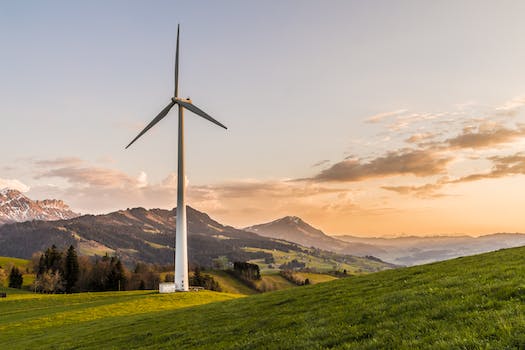Innovations in Environmental Technology
Environmental technology has been undergoing significant transformations, driven by the urgent need to address climate change, reduce pollution, and conserve natural resources. These innovations are not only crucial for the planet's health but also present new opportunities for economic growth and sustainability. From renewable energy solutions to waste management advancements, environmental technology is at the forefront of modern scientific and engineering efforts.

Renewable Energy Solutions
One of the most critical areas of innovation in environmental technology is renewable energy. Solar and wind power have become increasingly efficient and affordable, making them viable alternatives to fossil fuels. Recent advancements in photovoltaic cells have improved the efficiency of solar panels, allowing them to convert more sunlight into electricity. Similarly, wind turbine technology has evolved, with larger and more efficient turbines being deployed both onshore and offshore.
According to the International Energy Agency (IEA), renewable energy sources are expected to account for nearly 30% of global electricity generation by 2024 (iea.org). This shift is driven by technological advancements and supportive government policies that encourage the adoption of clean energy.
The integration of renewable energy into existing power grids has also seen significant progress. Smart grid technology enables better management of electricity demand and supply, reducing wastage and enhancing the reliability of renewable energy sources. Battery storage systems are another innovation that complements renewable energy by storing excess power generated during peak production times for use when production is low.
Advanced Waste Management
Another area where environmental technology is making a substantial impact is waste management. Traditional methods of waste disposal, such as landfilling and incineration, have significant environmental drawbacks. Innovations in this field focus on reducing waste generation, increasing recycling rates, and developing sustainable disposal methods.
One notable development is the advent of zero-waste technologies, which aim to eliminate waste by redesigning products and processes to minimize resource use and recover materials that would otherwise be discarded. Companies like TerraCycle are leading the way by creating recycling programs for hard-to-recycle items (terracycle.com).
Another innovative approach is the use of bioreactors for waste treatment. These systems utilize microorganisms to break down organic waste into useful byproducts like biogas and compost. This not only reduces the volume of waste sent to landfills but also generates renewable energy and valuable soil amendments.
Sustainable Agriculture
Agriculture is a significant contributor to environmental degradation, but technological innovations are helping make farming more sustainable. Precision agriculture uses data analytics, satellite imagery, and IoT devices to optimize crop management practices, reducing the need for water, fertilizers, and pesticides.
Vertical farming is another groundbreaking innovation that allows crops to be grown in stacked layers using controlled-environment agriculture techniques. This method significantly reduces land use and water consumption compared to traditional farming methods. Companies like AeroFarms are pioneering vertical farming solutions that can produce higher yields with less environmental impact (aerofarms.com).
Genetically modified organisms (GMOs) are also contributing to sustainable agriculture by creating crops that are more resistant to pests, diseases, and extreme weather conditions. While GMOs remain a controversial topic, their potential to enhance food security and reduce agricultural inputs cannot be ignored.
Water Conservation Technologies
Water scarcity is a growing concern globally, with many regions facing severe droughts and dwindling water supplies. Innovations in water conservation technology are essential for ensuring sustainable water use and protecting this vital resource.
Desalination technology has advanced significantly, making it possible to convert seawater into potable water more efficiently. Modern desalination plants use reverse osmosis membranes that require less energy and produce less brine waste compared to older technologies.
Another important innovation is smart irrigation systems that use sensors and data analytics to optimize water use in agriculture. These systems can adjust watering schedules based on soil moisture levels, weather forecasts, and crop needs, significantly reducing water wastage.
| Technology | Application | Impact |
|---|---|---|
| Solar Panels | Renewable Energy | Reduces reliance on fossil fuels |
| Bioreactors | Waste Management | Converts waste into energy and compost |
| Vertical Farming | Agriculture | Saves land and water resources |
| Desalination Plants | Water Conservation | Provides potable water from seawater |
| Smart Grids | Energy Distribution | Improves efficiency and reliability of power supply |
Sustainable Transportation
The transportation sector is a major source of greenhouse gas emissions, but innovations in this field are paving the way for more sustainable mobility options. Electric vehicles (EVs) have gained significant traction due to advancements in battery technology that have increased their range and reduced charging times.
The development of hydrogen fuel cell vehicles offers another promising alternative to traditional internal combustion engines. These vehicles emit only water vapor as a byproduct and can be refueled quickly compared to battery-powered EVs.
- Electric Vehicles (EVs): Reduced greenhouse gas emissions compared to gasoline-powered cars.
- Hydrogen Fuel Cells: Zero-emission vehicles with fast refueling times.
- Bicycle Sharing Programs: Promote non-motorized transportation options in urban areas.
- Aerial Drones: Used for delivering goods efficiently while reducing traffic congestion.
The innovations in environmental technology are not just futuristic concepts; they are practical solutions being implemented today to combat pressing environmental challenges. From renewable energy sources like solar panels and wind turbines to advanced waste management systems utilizing bioreactors, these technologies are making a tangible difference in our world. Sustainable agriculture practices such as precision farming and vertical farming are revolutionizing how we grow food while conserving resources.
Sustainable transportation options like electric vehicles and hydrogen fuel cells are reducing our reliance on fossil fuels and lowering emissions. Water conservation technologies like desalination plants and smart irrigation systems ensure that we manage our precious water resources wisely. As we continue to develop and adopt these innovative technologies, we move closer to a more sustainable future where economic growth aligns with environmental stewardship.